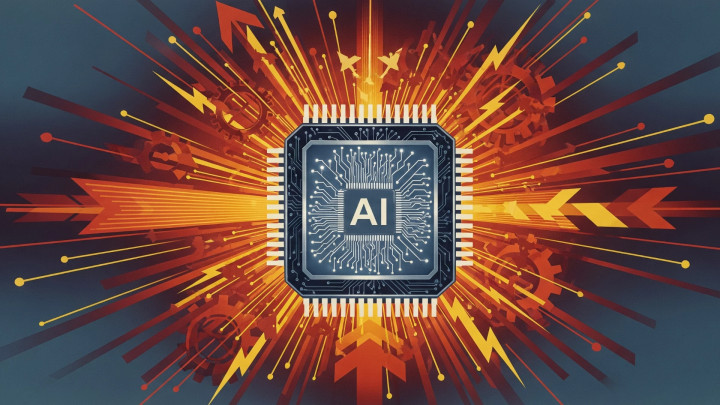From Search to Answers: How the Largest Search Engine is Reshaping the Entire Internet
The introduction of Google's AI Overviews marks a turning point in the evolution of the internet, catalyzing a paradigm shift from a referral-based web to an answer-centric ecosystem. This transformation, driven by generative artificial intelligence, is fundamentally changing the long-standing symbiotic relationship between search engines, content creators, and users.

The impact of AI Overviews on the digital economy can no longer be ignored. This technological innovation poses an existential challenge to the established models of online content monetization. By synthesizing data from multiple independent studies and examining industry responses, this article will review what the significant reduction in organic traffic to publisher websites means, uncover the resulting economic and societal consequences, and evaluate the emerging strategies for adapting to this new reality.
A Turning Point for the Digital Economy
The digital economy is at a critical juncture. The introduction and widespread integration of Google's AI Overviews—AI-generated summaries appearing at the top of search results—is more than a simple technical feature; it represents a fundamental transformation in how information is accessed and consumed online. For decades, the internet's value exchange was based on a simple, symbiotic model: Google dominated the search market by directing users to relevant websites, which in turn allowed content creators to monetize their work through advertising and subscriptions, while users gained free access to a vast repository of information. This "link-based web" has been the cornerstone of the digital content industry.
The appearance of AI Overviews disrupts this balance. By providing direct answers to user queries on the Search Engine Results Page (SERP), Google is transforming from a "gateway to the web" into a self-contained "answer engine." This change significantly reduces users' motivation to click through to external websites—a trend supported by the latest research. This practice challenges the sustainability of content creators and reshapes the flow of value across the internet.
A Symbiotic Relationship Under Strain
Since establishing its dominance in the late 1990s, Google has maintained a stable, mutually beneficial ecosystem. This system allowed:
- Content creators to earn revenue from ads and subscriptions funded by traffic directed by Google.
- Users to have free access to a diverse range of high-quality information.
- Google to profit from its role as an intermediary, selling advertisements against search queries.
This model fueled the explosive growth of the open web, supporting everyone from major news organizations to niche blogs and independent creators. However, this relationship is now under severe strain as Google's strategic priorities evolve in the age of generative AI.
Quantifying the Traffic Reduction
The essence of this change lies in the quantifiable and dramatic decrease in organic traffic to publisher websites.
- Massive Drop in Click-Through Rate (CTR): Studies show a significant decline in clicks on traditional organic results when an AI Overview is present. Some analyses covering hundreds of websites have shown double-digit percentage drops in publisher traffic in the months following the wider rollout of AI-based search features.
- The Rise of "Zero-Click" Searches: The most critical finding is the steep decline in user interaction with external links. Landmark research analyzing user browsing data found that clicks on traditional search links were nearly cut in half when an AI Overview was present. Even more shockingly, a negligible fraction of users clicked on the source links provided within the AI summary itself. The same study also revealed that users were more likely to end their browsing session on the results page, suggesting the AI summary satisfied their needs without further exploration.
- Disproportionate Impact: The traffic loss is not uniform. Non-branded, informational queries—the lifeblood of many content creators—suffer the most. In contrast, branded queries that trigger an AI Overview may sometimes see a CTR increase, likely due to high user intent.
These are not just statistics; they are a direct threat to the business models that have sustained the open web for more than two decades.
Economic and Social Consequences
The steep decline in referral traffic triggers a cascade of negative effects that extend beyond publisher balance sheets.
Direct Economic Impacts:
- Evaporation of Ad Revenue: For a vast number of websites, traffic is directly proportional to advertising income. A sustained drop in visitors leads to a corresponding decline in revenue, threatening the financial stability of both large and small publishers.
- Sustainability Crisis for Creators: The "Google Zero" phenomenon, where Google provides answers without clicks, jeopardizes the livelihoods of countless independent journalists, bloggers, and niche experts who have built their businesses on organic search.
- Undermining the Link-Based Economy: The fundamental premise of Search Engine Optimization (SEO)—that high rankings generate traffic—is being upended. The focus is shifting from "ranking" to being "cited" in an AI Overview, which, as data shows, rarely translates to a click.
Broader Social Consequences:
- Centralization of Information: By summarizing content, AI Overviews position Google as the primary source of information, rather than a guide to it. This concentrates immense power in a single, opaque AI system.
- The "Invisibility" of Original Sources: The original creators of the information synthesized by the AI are obscured, diminishing their recognition and authority. This raises critical questions about intellectual property and fair compensation.
- Threat to Information Diversity: If the economic model supporting diverse content creation collapses, the web risks becoming less vibrant and more homogeneous, dominated by the few entities that can survive without search traffic or that strike licensing deals with AI companies.
Industry Reactions and Adaptive Strategies
The publishing industry's reaction has been swift and deeply concerned. Headlines declaring that "AI is killing the web" or that "Google is burying the web alive" are not mere exaggerations but reflections of a real business crisis.
In response, new survival strategies are emerging:
- The AI "Paywall": One innovative response has come from tech infrastructure companies, which are now offering tools that allow website owners to block AI crawlers by default and charge them for access to their content. This is a direct attempt to re-establish a value exchange, compelling AI companies to compensate creators for the data that fuels their models.
- Licensing Agreements: Some large publishers are negotiating direct licensing deals with AI companies, opting to be paid upfront for their content. However, this model is only viable for the largest players, potentially deepening the divide between media giants and smaller publishers.
- Diversification: Publishers are urgently seeking to reduce their dependence on Google by building direct relationships with their audiences through newsletters, subscriptions, and community platforms.
Google's Position and Future Outlook
Google maintains that its goal is to help users get information faster and that AI Overviews serve as a "jumping-off point" for deeper exploration. The company states it has already served billions of queries with AI Overviews and is rapidly expanding the feature. However, these claims are met with significant skepticism and are contradicted by multiple independent, third-party data analyses.
We are in a period of a historic transition. The old, link-based model is colliding with a new, AI-driven one, and the outcome is uncertain. The key questions for the future are:
- What new business models will prove sustainable for content creators?
- How can the creation of high-quality, original information be financed in an era of diminishing referral traffic?
- How can the diversity, openness, and reliability of the web be preserved against the centralizing force of AI?
The data on the impact of AI Overviews, therefore, does not just document the current situation but serves as a crucial early indicator of a profound technological and economic transformation. The web as we have known it is fundamentally changing, and the long-term health of the digital information ecosystem will depend on the answers to these challenges.





